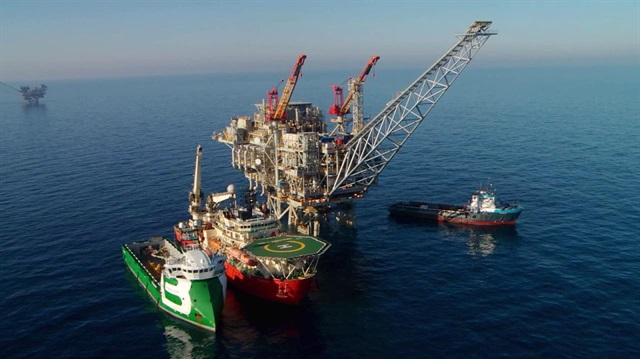
Expert findings indicate that there is a natural gas deposit in the eastern Mediterranean with a total value of $3 trillion
Turkey’s maritime jurisdiction has resurfaced on the agenda as a power struggle regarding energy reserves in the eastern Mediterranean continue. It is claimed that there are natural gas reserves in Turkey’s maritime jurisdiction that could meet 572 years’ worth of the country’s energy needs.
Greece, which seeks control of energy deposits of the eastern Mediterranean, is trying to draw sea borders via Libya and Crete. Meanwhile, the Greek Cypriot administration is negotiating with Egypt and Israel.
According to Dr. Cihat Yaycı’s “The Issue of Sharing Marine Jurisdiction in the eastern Mediterranean and Turkey,” this region boasts rich energy resources.
Considering the size of the total hydrocarbon deposits in the eastern Mediterranean, Dr. Yaycı emphasized that it would be sufficient to meet 572 years’ worth of Turkey's natural gas needs. According to Turkish Petroleum Corporation (TPAO) estimates, the eastern Mediterranean is also rich in gas hydrate deposits, which have been dubbed as the energy of the future.
Greece is trying strike a deal with the Greek Cypriot administration. In some maps published by Israel, the Greek Exclusive Economic Zone is shown as the continuation of South Cyprus.
However, Turkey has increased its efforts in the face of this cooperation. It recently halted Italian ships who sought to conduct drilling in the Turkish Republic of Cyprus with warships.
South Cyprus is attempting to sign an agreement with Egypt and Libya over oil exploration sites it has set up in the main land state of Egypt and Israel, which accepted the deal despite incurring losses in order to spite Turkey.
The Greek Cypriot administration and Greece are trying forge legitimacy in the eastern Mediterranean with these agreements, contrary to international law and legitimacy. The sole purpose is to prevent Turkey from benefitting from energy resources.
In response, Turkey is declaring its rights as per the Exclusive Economic Zone and affirms its determination to defend its rights. Turkey’s previous maritime jurisdiction areas were redrawn by Dr. Yaycı.
Turkey is seeking to determine jurisdiction areas through agreements with Libya, Egypt, Lebanon, Israel and Syria. If necessary, Turkey will notify the United Nations of the detrimental efforts of Greece and the Greek Cypriot administration.
In the eastern Mediterranean, the Greek Cypriot administration, Libya, Syria, Lebanon and Israel have been declared exclusively in the Economic Zone.
Dr. Yaycı stated that the maritime jurisdiction deals that the Greek Cypriot administration signed with Israel, Lebanon and Egypt would do them more harm than good. Israel was afforded 4,600 square kilometers, Lebanon was afforded 3,957 square kilometers and Egypt was afforded 21,500 square kilometers of maritime jurisdiction in the deal.
According to his studies, Dr. Yaycı claims that had Israel signed a deal with Turkey instead of the Greek Cypriot administration, it would have attained a far greater area of maritime jurisdiction. The same is applicable for Egypt, and now both countries are attempting to abort the deals they struck.
Expert findings indicate that there is a natural gas deposit in the eastern Mediterranean with a total value of $3 trillion. The U.S. Geological Survey Center estimates that there are 3.45 trillion cubic meters of natural gas and 1.7 billion barrels of oil in the Levant Basin, which lies between Cyprus, Lebanon, Syria and Israel.
It is estimated that about 1.8 billion barrels of oil, 6.3 trillion cubic meters of natural gas and 6 billion barrels of liquid natural gas are located in the Nile Delta Basin. Apart from the 8 billion barrels of oil that is thought to be found around Cyprus Island, the south of Crete, called Heredot, is estimated to have 3.5 trillion cubic meters of natural gas.











